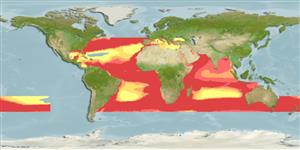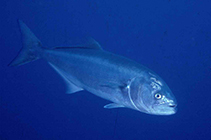Adicionar sua observação em Fish Watcher
| Native range | All suitable habitat | Point map | Year 2050 |

|
| This map was computer-generated and has not yet been reviewed. |
| Pomatomus saltatrix AquaMaps Data sources: GBIF OBIS |
United States (contiguous states) country information
Common names:
Bluefish
Occurrence: native
Salinity: marine
Abundance: | Ref:
Importance: minor commercial | Ref: FAO, 1994
Aquaculture: | Ref:
Regulations: | Ref:
Uses: gamefish: yes;
Comments: Absent from southern Florida (Ref. 7251). Abundant along the east and Gulf coasts; a major sport fish (Ref. 9987). Also Ref. 276, 4751, 26938.
National Checklist:
Country Information: https://www.cia.gov/library/publications/resources/the-world-factbook/geos/us.html
National Fisheries Authority: http://www.nmfs.gov
Occurrences: Occurrences Point map
Main Ref: Robins, C.R. and G.C. Ray, 1986
National Database:
Occurrence: native
Salinity: marine
Abundance: | Ref:
Importance: minor commercial | Ref: FAO, 1994
Aquaculture: | Ref:
Regulations: | Ref:
Uses: gamefish: yes;
Comments: Absent from southern Florida (Ref. 7251). Abundant along the east and Gulf coasts; a major sport fish (Ref. 9987). Also Ref. 276, 4751, 26938.
National Checklist:
Country Information: https://www.cia.gov/library/publications/resources/the-world-factbook/geos/us.html
National Fisheries Authority: http://www.nmfs.gov
Occurrences: Occurrences Point map
Main Ref: Robins, C.R. and G.C. Ray, 1986
National Database:
Common names from other countries
Classificação / Names Nomes comuns | Sinônimos | Catalog of Fishes(Gênero, Espécies) | ITIS | CoL | WoRMS | Cloffa
> Scombriformes (Mackerels) > Pomatomidae (Bluefishes)
Etymology: Pomatomus: Greek, poma, -atos = cover, operculum + Greek, tomos = portion (Ref. 45335).
More on author: Linnaeus.
Etymology: Pomatomus: Greek, poma, -atos = cover, operculum + Greek, tomos = portion (Ref. 45335).
More on author: Linnaeus.
Environment: milieu / climate zone / depth range / distribution range Ecologia
marinhas; estuarina; oceanódromo (Ref. 51243); intervalo de profundidade 0 - 200 m (Ref. 54708). Subtropical; 53°N - 44°S, 98°W - 180°E
Distribuição Países | Áreas da FAO | Ecossistemas | Ocorrências | Point map | Introduções | Faunafri
Circumglobal: In tropical to subtropical waters; except the eastern Pacific (Ref. 33390). Eastern Atlantic: Portugal to South Africa, including the Mediterranean and Black Sea, Madeira, and the Canary Islands. Western Atlantic: Canada and Bermuda to Argentina (Ref. 7251). Indian Ocean: along the coast of East Africa, Madagascar, southern Oman, southwest India, the Malay Peninsula, and Western Australia (Ref. 11441). Southwest Pacific: Australia except the Northern Territory, and New Zealand (Ref. 11441). Absent from eastern Pacific and northwest Pacific. Barely entering the Western Central Pacific region. Records from the Northern Territory, Australia and from Indonesia appear to be erroneous (Ref. 9860). Occurrence in Taiwan (Ref. 5193) and Hawaii (Ref. 4517) need verification.
Comprimento de primeira maturação / Tamanho / Peso / Idade
Maturity: Lm 30.0 range ? - ? cm
Max length : 130 cm TL macho/indeterminado; (Ref. 11441); common length : 60.0 cm TL macho/indeterminado; (Ref. 3482); peso máx. publicado: 14.4 kg (Ref. 4699); idade máx. registrada: 14 anos (Ref. 128525)
Max length : 130 cm TL macho/indeterminado; (Ref. 11441); common length : 60.0 cm TL macho/indeterminado; (Ref. 3482); peso máx. publicado: 14.4 kg (Ref. 4699); idade máx. registrada: 14 anos (Ref. 128525)
Descrição suscinta Chaves de identificação | Morfologia | Morfometria
Espinhos dorsais (total) : 8 - 9; Raios dorsais (total) : 23 - 28; Espinhos anais: 2 - 3; Raios anais : 23 - 27. Jaw teeth prominent, sharp, compressed, in a single series. Two dorsal fins, the first short and low, with 7 or 8 feeble spines connected by a membrane. Back greenish, sides and belly silvery (Ref. 9860).
Occur in oceanic and coastal waters (Ref. 26340). They are most common along surf beaches and rock headlands in clean, high energy waters, although adults can also be found in estuaries and into brackish water (Ref. 6492). Small fish may be found in shallow coastal waters at least 2 m depth (Ref. 9563), in schools pursuing and attacking small fishes (Ref. 9626). Adults are in loose groups, often attacking shoals of mullets or other fishes and destroying numbers apparently far in excess of feeding requirements (Ref. 9860). Feed on other fish (Ref. 5377), crustaceans and cephalopods (Ref. 47377). Associated with sharks and billfishes (Ref. 26340). Voracious and aggressive (Ref. 9626), reported to bite when handled. Migrate to warmer water during winter and to cooler water in summer (Ref. 9987). Popular game fish (Ref. 6638). Good food fish; marketed mostly fresh (Ref. 9860), but also dried or salted (Ref. 5284), and frozen (Ref. 9987).
Ciclo de vida ou comportamento de acasalamento Maturidade | Reprodução | Desova | Ovos | Fecundidade | Larvas
Fecundity varies from 400,000 to 2,000,000 eggs depending on the size of the individual (ranging from 370,000 in a 31 cm fish to 1,240,000 in a 54 cm fish) (Ref. 27695).
Tailor are serial spawners (Ref. 6390).
Referência principal
Upload your references | Referências | Coordenador | Colaboradores
Dooley, J.K., 1990. Pomatomidae. p. 721-722. In J.C. Quero, J.C. Hureau, C. Karrer, A. Post and L. Saldanha (eds.) Check-list of the fishes of the eastern tropical Atlantic (CLOFETA). JNICT, Lisbon; SEI, Paris; and UNESCO, Paris. Vol. 2. (Ref. 9986)
Status na Lista Vermelha da UICN (Ref. 130435: Version 2024-2)
Vulnerável, ver Livro Vermelho da UICN (VU) (A2bd); Date assessed: 07 July 2014
Uso pelos humanos
Pescarias: altamente comercial; Aquacultura: espécies comerciais; peixe esportivo: sim; isca: usually
FAO(Aquaculture systems: produção; pescarias: produção, perfil da espécie; publication : search) | FishSource | Sea Around Us
Mais informação
Population dynamics
Parâmetros de crescimento
Max. ages / sizes
Length-weight rel.
Length-length rel.
Frequências de comprimento
Conversão de massa
Recrutamento
Abundância
Parâmetros de crescimento
Max. ages / sizes
Length-weight rel.
Length-length rel.
Frequências de comprimento
Conversão de massa
Recrutamento
Abundância
Life cycle
Reprodução
Maturidade
Fecundidade
Desova
Spawning aggregations
Ovos
Desenvolvimento dos ovos
Larvas
Dinâmica larval
Reprodução
Maturidade
Fecundidade
Desova
Spawning aggregations
Ovos
Desenvolvimento dos ovos
Larvas
Dinâmica larval
Physiology
Body composition
Nutrients
Consumo de oxigênio
Tipo de natação
Velocidade de natação
Visual pigments
Fish sound
Diseases & Parasites
Toxicity (LC50s)
Body composition
Nutrients
Consumo de oxigênio
Tipo de natação
Velocidade de natação
Visual pigments
Fish sound
Diseases & Parasites
Toxicity (LC50s)
Human related
Aquaculture systems
Perfis para aquacultura
Estirpes
Ciguatera cases
Stamps, coins, misc.
Aquaculture systems
Perfis para aquacultura
Estirpes
Ciguatera cases
Stamps, coins, misc.
Ferramentas
Bio-Quiz | Livro eletrônico | Guia de campo | Ferramenta auxiliar de frequências de comprimento | Ferramenta sobre a história de vida | Mapa de pontos | Classification Tree
| Catch-MSY |
Relatórios especiais
Checar Manutenção em Aquário | Checar Planilhas de Fatos sobre as Espécies | Checar Planilhas de Fatos sobre Aquicultura
Baixar XML
Fontes da internet
Aquatic Commons | BHL | Cloffa | BOLDSystems | Websites from users | Checar Observador de Peixes (FishWatcher) | CISTI | Catalog of Fishes(Gênero, Espécies) | DiscoverLife | ECOTOX | Faunafri | Fishtrace | GenBank(genoma, nucleotídeo) | GloBI | GOBASE | GoMexSI (interaction data) | | Google Books | Google Scholar | Google | IGFA World Record | MitoFish | Bases de dados nacionais | OsteoBase(skull, spine) | Otolith Atlas of Taiwan Fishes | Aquários públicos | PubMed | Reef Life Survey | Scirus | SeaLifeBase | Árvore da vida | Wikipedia(Ir para, procura) | World Records Freshwater Fishing | Registro zoológico
Estimates based on models
Preferred temperature (Ref. 115969): 8.4 - 27.5, mean 21.1 (based on 1273 cells).
Índice de diversidade filogenética (Ref. 82804): PD50 = 1.5000 [Uniqueness, from 0.5 = low to 2.0 = high].
Bayesian length-weight: a=0.01072 (0.00844 - 0.01360), b=2.96 (2.89 - 3.03), in cm Total Length, based on LWR estimates for this species (Ref. 93245).
Nível Trófico (Ref. 69278): 4.5 ±0.3 se; based on diet studies.
Resiliência (Ref. 120179): médio(a), tempo mínimo de duplicação da população 1,4 - 4,4 anos (K=0.10-0.2; tm=2; tmax=9; Fec=1 million).
Prior r = 0.47, 95% CL = 0.31 - 0.71, Based on 3 full stock assessments.
Fishing Vulnerability (Ref. 59153): Moderate vulnerability (42 of 100).
Climate Vulnerability (Ref. 125649): Moderate to high vulnerability (46 of 100).




